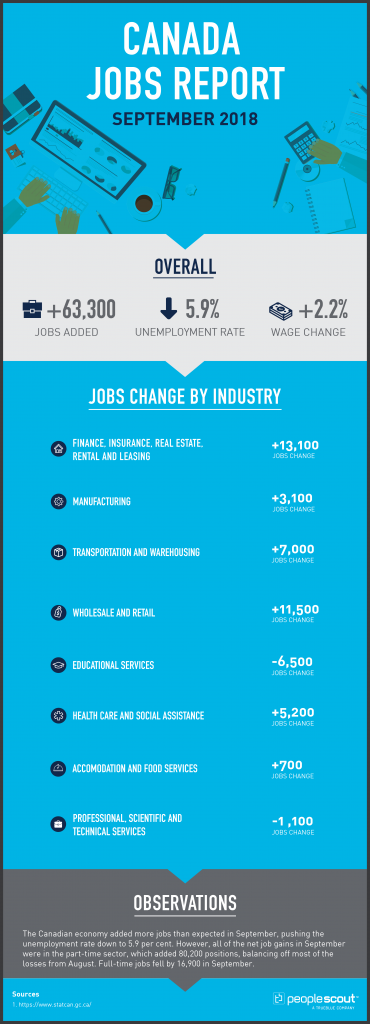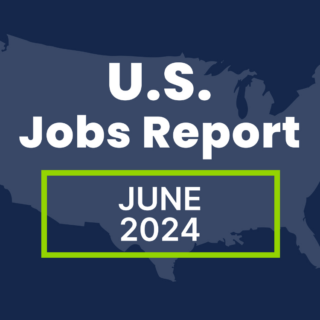
Statistics Canada released its September 2018 Labour Force Survey which shows a gain of 63,300 jobs for the Canadian economy which drove the unemployment rate down to 5.9 per cent, down from 6.0 per cent in August. Contributing to the drop in unemployment was a gain of 80,200 part-time positions.
The Numbers
63,300: The economy gained 63,300 jobs in September.
5.9%: The unemployment rate fell to 5.9 per cent.
2.2%: Weekly wages increased 2.2 per cent over the last year.
The Good
September’s job gains, fueled by the increase in part-time employment reversed the job losses from the previous month. The report shows that in Ontario, employment increased by 36,000, the third increase in four months. Employment in British Columbia increased by 33,000, driven by gains in full-time work (+26,000). In the third quarter, employment increased by 54,000, following a decline over the first half of 2018.
In September, more Canadians worked in construction; finance, insurance, real estate, rental and leasing; public administration and agriculture. Compared with September 2017, employment was up 222,000 or 1.2 per cent, entirely the result of gains in full-time work (+224,000). Over the same period, total hours worked increased 0.7 per cent.
The Bad
The Canadian economy lost 16,900 full-time jobs in September. At the same time, employment fell in information, culture and recreation and business, building and other support services. Employment increased in Ontario and British Columbia while it was little changed in the remaining provinces. Statistics Canada reported that the number of self-employed Canadians declined by 35,000 after recording an almost equal total increase over the past twelve months.
The monthly labour force survey also found that all of the job gains in September were made by workers in the core 25-to-54 age range with virtually no change in youth employment. September’s youth unemployment rate stood at 11.0 per cent, up by 0.1 percentage points from the previous month and more than 5 percentage points higher than the working population as a whole.
The Unknown
Canada agreed to a new trade deal with the United States and Mexico to replace the North American Free Trade Agreement (NAFTA). The CBC notes that as “details of the newly renegotiated deal (the United States-Mexico-Canada Agreement or USMCA) emerge, some questions remain about what Canada’s signature guarantees in terms of protections, and what concessions were made…”
While the Canadian dairy industry will have new barriers imposed in the new agreement, the Canadian auto industry appears to be a winner in the USMCA, but these wins may not be lasting. The CBC report continues, “Canada seems to have escaped..Section 232 national security tariffs — which would slap 20 to 25 per cent duties on cars and auto parts imported into the U.S… no hard limit will be placed on Canadian auto exports to the U.S., though if the U.S. moves forward with the imposition of worldwide 232 tariffs on autos, those would also apply to Canada.”


